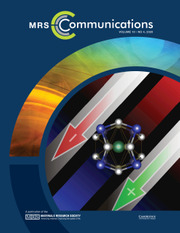MRS Communications is a journal where you may submit high-impact, cutting-edge research in what promises to be a reliable, highly visible forum. This long overdue “letters” journal will leverage the connections that the Materials Research Society has with materials researchers worldwide in order to become one of the world's great scientific archival journals. I feel confident that you share our enthusiasm that MRS Communications is finally a reality. Indeed, we recognize that your expectations are high and it is our goal to meet them!
My vision for MRS Communications is that it will become the primary journal where the very best materials researchers in the world, from industry, national laboratories and academia, look forward to publishing their best research. Advantages of publishing in MRS Communications include the fact that editorial decisions are made by practicing materials researchers. The focus of the journal will be on RAPID high-quality communication of results. In addition, we are able to harness the world-class content and expertise of researchers who participate in MRS Meetings. MRS Communications should therefore be a medium where readers first learn about cutting-edge materials research. This journal, moreover, will be a place where readers learn about international developments in materials research, possible implications of major science policy and funding decisions, and related issues of interest to scientists and engineers.
This is a truly exciting time for our field as the pace, scope and breadth of discoveries has increased more rapidly than ever before. Creative synthetic routes for producing different forms of matter, wherein the structure and functionality are controlled over various length scales, continue to be uncovered. Novel techniques are being developed to probe properties over vast temporal and spatial scales. Advances in computing and theoretical techniques now enable much stronger coupling with experiments, thereby leading to new insights not previously possible. Societal challenges for areas such as renewable energy and climate change worldwide have imposed high expectations on the field for materials functionality. New funding in these areas now fuels rapid and diverse advances that would have been difficult to anticipate in the not-very-distant past. Major contributions of technical and scientific discoveries from institutions in Asia, together with new collaborations between researchers from different countries around the globe, contribute significantly to advances in materials research.
MRS Communications is intended to widely disseminate transformative ideas and cutting-edge discoveries in our highly interdisciplinary field and to complement the current MRS portfolio of technical publications, reflecting current research reported at our meetings. We have introduced “Prospectives”, forward-looking review articles that provide a view of topics of broad interest to the materials community. We also plan to publish articles that provide assessments of new advances discussed at MRS Meeting symposia in current and emerging areas. The topics of interest in MRS Communications will include synthesis and novel properties of hard and soft functional materials, and their diverse applications.
While a number of newly established journals have experienced rapid success leading to fierce competition, the timing for MRS Communications is nonetheless excellent. The aforementioned reasons for rapid growth of the field and MRS's pivotal role in its development, coupled with your enthusiasm for a journal with editors from your ranks, and the choice of the publishing partner, Cambridge University Press, have many obvious advantages. Indeed, there is more than sufficient “space” for MRS Communications to serve your needs and to thrive.
We realize that the first few issues of MRS Communications will set the tone and leave lasting impressions of what this journal can offer. Your expectations are high and you are likely to have the following questions about this journal:
1. Will an author with an important manuscript receive wide and important readership if published in MRS Communications?
2. Will materials researchers consider MRS Communications the primary journal in which they should publish their very best work, as well as to learn about the most important new developments in the field?
3. Five years from now, will MRS Communications be on par with the top materials research journals in the world?
4. Will a graduate student aspire to get a manuscript published in MRS Communications? Will postdoctoral researchers believe that publication in this journal will help “make” their careers?
5. Will the papers in this journal truly represent a balanced picture of where the field is going, and NOT a subjective view of select editors?
6. Will authors feel that their papers receive a fair hearing, i.e., is the referee process fair and thorough? Are there avenues for expedient adjudication?
7. Is the peer review consistent and hence is the quality of papers that appear in the journal consistent?
Our goal is to ensure that the answers to these questions are strongly affirmative!
Indeed, the new publication space is fluid, so my plan is to develop a mechanism for MRS Communications to always remain relevant to its readers, old and new. I plan to implement processes that encourage the readership to vote on papers that they especially like each year. More importantly, I plan to institute a feedback system to give the editors of MRS Communications, confidentially, an idea of how well we are doing and how the journal is doing. In addition I will develop, together with the editors, effective strategies for increasing readership and submissions.
With your help, high-quality submissions and constructive feedback, the journal's Principal Editors and I expect to achieve this vision. Some of our immediate plans include discussions, information sessions and informal interviews of researchers, in order to gain insights, new directions and a better understanding of author experiences/expectations. The information you provide will inform, in part, our overall strategy for making MRS Communications a success.
In conclusion, the success of MRS Communications will rely on a constructive and effective partnership between you, the readers and authors, and the MRS Communications editors and staff. Thank you, in advance, for helping us build a world-class journal. We look forward to working with you.




